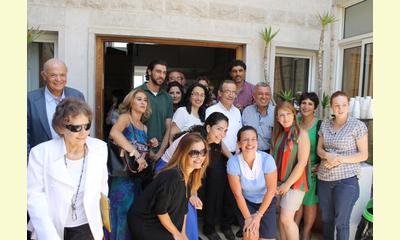|
|
Academic University for Non-violence and Human Rights for the Arab Region
un article par Phyllis Kotite
During the continuing national and regional
tension, the summer session for the Academic
University for Non-violence and Human Rights for
the Arab region was attended by Arab specialists
from 5 countries....Palestine, Lebanon, Syria,
Iraq and Jordan...all countries experiencing an
impact of the Arab spring.

click on photo to enlarge
An intensive three week course was highlighted by
a rich discussion on relevant subjects: pioneers
of non-violence and also 'désarmer les dieux', an
analysis of the Old and New Testament and the
Koran, and the misuse of religion for political
objectives in history (Jean Marie Muller);
origins of non-violence: community, sociological
and psychological aspects (Ogarit Younan, co-
founder of the University); human rights in
general and specifics in the Arab region (Hussain
Shaban); teaching non-violence in education
(Antonella Verdiani); the prevention of conflict
and peacebuilding, with group problem solving on
alternatives actions to specific conflicts in
their countries (Phyllis Kotite); and the
psychology of human rights (Mona Charabati).
Courses were given or translated into Arabic.
A special day was devoted to an innovative
presentation on the evolution of art and non-
violence or pacific activity of man with photos of
cave drawings of the prehistoric period; and
cuneiform and hieroglyphics from Sumer and Egypt,
the earliest civilizations of history,
illustrating peaceful activities as well as
defensive action. Included was the realism of
20th century art, often depicting the horrors of
conflict as a means of invoking a reaction in
favour of peace, eg; Picasso's Guernica, (Elham
Kallab). Co-founder Walid Slaybi spoke on "Why
non-violence" and gave examples of civil
disobedience and civil society activities of
Gandhi and M. L. King. A Lebanese song writer,
(Ahmed Kabbour) wrote a special piece for the
occasion which was also presented in record form;
and two Muslim religious figures, from Damascus
and Nablus had on line live messages piped in from
their countries.
Week-end activities included a visit to ancient
Byblos, which experienced about 14 different
occupations in its history; the Shouf mountains,
and different sojourns to the capital Beirut. The
participants consisted of representatives from
various organizations: education, government
bodies, media--tv and radio, civil rights and
refugee institutions, women and youth
organizations, cultural development, sustainable
development, Red Crescent and health groups
(psychology also).
AUNOHR offers higher degrees to specialists who
attend summer courses and continue their work;
during the year. The course will be on line (Isaam Mansour, vice-president).
AUNOHR also has a Training Centre which has
special advisory services, short term training or
workshops for policy makers, civil society,
parliamentarians, the media and enterprises.
Like the proverbial 'phoenix rising from the
ashes', the embattered peoples of the Middle East
are continuing their efforts at developing a
culture of peace. AUNOHR, whose founders have 30
years of experience in training, peace education,
mediation and civil rights, have established links
throughout the world and welcome your interest and
collaboration. university@aunohr.org or
i.mansour@aunohr.org
|








|
DISCUSSION
Question(s) liée(s) à cet article:
The Arab spring of 2011, Can it inspire democratic movements around the world?
* * * * *
Commentaire le plus récent:
The following is reprinted from Common Ground News Service (CGNews), 30 August 2011, www.commongroundnews.org
Copyright permission is granted for publication.
Cultures of peace, lasting change in Egypt?
Joseph Mayton
Cairo - Instead of falling victim to Egypt’s eye-for-an-eye past, a concerted effort to create a culture of peace in what has quickly become a starkly fractured political scene – between religious groups, the military and activists, and activists and the people – may well be the best opportunity to bring about a new Egypt with social justice, transparency and tolerance.
Egyptians are striving daily to show the world that societies can change. Cairo is not the same city it was six months ago. As voices now begin to breech the political and social stalemate in the country, Egyptian society can, through a culture of peace, set a precedent not only for their own country but for the whole region.
UNESCO defines the culture of peace as “a set of values, attitudes, modes of behaviour and ways of life that reject violence and prevent conflicts by tackling their root causes to solve problems through dialogue”. In Egypt, for example, this could help develop an overall sense that the "other", who participated in violent acts in the past, can become part of society, instead of remaining on the outskirts as they are currently. Building such a culture in Egypt would follow the South African model of reconciliation, which allowed the country to look forward instead of focusing on the frustrating and sad past of apartheid.
Instilling a culture of peace in the younger generation could be a great antidote to the older generations’ mistrust and antagonism toward one another – Christian versus Muslim; Worker versus Owner; Military versus the People; and so on.
In Egypt, one of the root causes of a lack of a culture of peace is the educational system. Young Egyptian students are taught that they are different from one another, that their respective faiths are cause for separation. In schools, Christian students study the history and faith of Christianity separately, while Muslim studentsdo the same for Islam. This creates a sense that each group is separate and divided when it comes to any national cause. . ... continuation.

|
|









